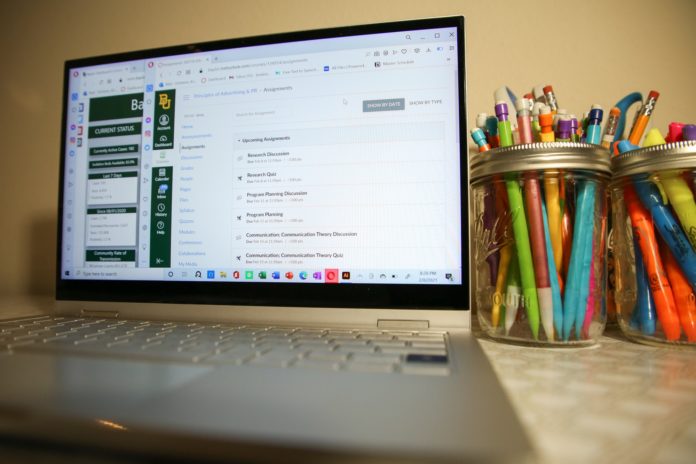
By Mallory Harris | Staff Writer
Throughout the pandemic, professors have had to adjust alongside students to the new avenues of teaching. Many Baylor professors feel accomplished after adapting to these changes.
Dr. Gary Carini, a professor of global strategic management in Baylor’s Master of Business Administration program, shared how his background in online teaching equipped him for the pandemic. But, many teachers did not have his experience.
“For me, it didn’t require as much of a switch as other faculty. I’ve always stuck to what percent of the faculty actually taught online courses prior to spring break [2020],” Carini said. “If you go to fall of 2019, about 8% of the faculty [taught online], so we moved from 8% to 100%.”
Even being familiar with online instruction, Carini said a challenge he still faces is keeping students engaged during class sessions. To keep students curious and encouraged, Carini mentioned how he starts conversations and introduces new articles that relate to class material to connect with students further in the online environment. However, by not having that immediate answer or face-to-face interaction, Carini explained that he likes to check-in on his students to make sure they don’t miss anything.
“It may be something as complex as a technology problem, and I want to be super sensitive to that and help provide a solution,” Carini said. “It could be that the workload is so incredibly grave they haven’t gotten back to me, and that’s fine. I just want to make sure I don’t lose them.”
Tracey Jones, a lecturer in the modern languages and cultures department, shared how her experience being an online student made the transition online a bit easier when she found herself on the other side of the screen. During Jones’ transition in spring 2020, she explained how balancing her family, teaching and dealing with world problems was really difficult. However, in her own classroom, Jones knew that keeping certain qualities the same would benefit her students in the long run.
“I already had this strong rapport with my students, I made really clear to them what the expectations were going to be for the end of the semester, and I think that’s super important,” Jones said. “I didn’t change our course calendar at all, I thought that was important. I was like, ‘We’re going to leave it as it is and proceed as if we’re not quarantined.’”
Jones mentioned how teaching a course in person and teaching online required different skill sets. By making her classes student-centered with assignments that allow them to explore vocabulary clues and real-world application through a show and tell, Jones explained these new ways students are growing.
“I could not have anticipated … [show and tell] could enrich the virtual space,” Jones said. “It’s high interest, high motivation and high participation. I think it was just really positive.”
As Jones focuses on teaching students how to speak other languages besides English, she wrote an article for Texas Teachers of English to Speakers of Other Languages about how summer 2020 was when she learned a great deal about online education. The article focuses on three main points: comfort zones can be challenged, it’s okay to be personal with your professors and a rhythm is still achievable online. By taking what she learned during her time as a student, Jones said she strives to be better for her own classroom.
Switching from in person to completely virtual was a challenge for students and teachers alike since it came with learning curves and new technology skills. However, facing those challenges is Jones’ favorite part about teaching, she said.
In their effort to be a leader among universities, Baylor’s professors have adapted to the global pandemic to teach students in new ways with the same high standard of education.
“There’s an incredible amount of knowledge that exists among students in the classroom, and I look forward to tapping into that and encouraging them to express their views; that’s absolutely most exciting,” Carini said.




